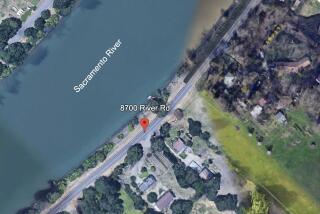Jury Convicts Man of 4 Serial Killings
- Share via
A San Bernardino County jury Tuesday found former long-haul truck driver Wayne Adam Ford guilty of four counts of first-degree murder for the brutal slayings of three prostitutes and a hitchhiker, women whose bodies were dumped -- some dismembered -- in waterways across California.
The jury’s verdicts came after a week of deliberation and will make the Arcata, Calif., man eligible for the death penalty when his sentencing hearing begins July 12.
“We got what we were seeking,” said Deputy Dist. Atty. J. David Mazurek, who tried the case, “and we’re now getting into what this case is really all about, which is what punishment he deserves.”
Ford stunned authorities when he walked into the Humboldt County Sheriff’s Department on Nov. 3, 1998, and confessed to killing four women. Ford was accompanied by his brother, who had encouraged him to turn himself in, and arrived carrying one victim’s severed breast in his pocket.
Ford’s attorneys, Deputy Public Defenders Joseph D. Canty Jr. and Steven A. Mapes, declined to comment after the verdicts, citing a gag order issued by Judge Michael A. Smith. During the trial, they tried to persuade the jury to find Ford guilty of a lesser charge -- second-degree murder or manslaughter -- that would have spared his life.
On Tuesday afternoon, Ford, 44, showed no emotion as the court clerk read the four guilty verdicts, and later chuckled over a joke that the judge made about whether the attorneys were prepared for the sentencing hearing.
His attorneys have portrayed Ford as a man with serious mental problems who was overwhelmed with remorse for killings that he has said were accidental.
During the trial, defense attorneys showed jurors videotape of Ford the night he surrendered -- choking back sobs as he explained to officers in Humboldt County that he “didn’t want to hurt people” and wanted authorities to stop him from harming others.
David Whitney, a retired prosecutor who had handled Ford’s case for six years, said he thought the jury might still question whether Ford deserves the death penalty.
Though the verdicts of the seven-woman, five-man panel were unanimous, some jurors may still question whether the killings were premeditated, he said.
“If even one of the jurors has some lingering doubt about that, then defense attorneys are sometimes able to convince them to render a verdict of less than death,” Whitney said. “The other big issue will be that Ford turned himself in, expressed great remorse, was very tearful in his interviews and at least made an effort to stop what he’d done. I think that’s something the jury will struggle with.”
After turning himself in, Ford admitted he had killed a hitchhiker -- still unidentified -- whose torso was later found by a kayaker in a slough in October 1997.
Ford said he had dismembered her body with a hunting knife, storing some of her body parts in his freezer before burying some and dropping others in the Mad River.
He also confessed to killing Las Vegas prostitute Tina Renee Gibbs, 26, whose body was found in Kern County in June 1998, and Fontana prostitute Lanett Deyon White, 25, whose body was found in a San Joaquin County irrigation canal in September 1998.
When Ford turned himself in, he carried the severed breast of his fourth and most recent victim, Hesperia prostitute Patricia Ann Tamez, 29. Tamez’s body was found in an aqueduct in San Bernardino County.
Though the killings occurred in four counties, prosecutors were able to combine the cases into one under California’s serial murder law. During the trial, which began in March, the prosecutor also presented DNA evidence that linked Ford to some of the killings.
During initial interviews with detectives, Ford said the four women had died while he had engaged in rough sex acts that involved choking, which was intended to increase their sexual pleasure. He said he had performed the same acts with many women and had let them go.
Canty also argued that Ford’s psychological problems clouded his mental state.
But Mazurek said Ford carefully planned the murders, and preyed on women to “satisfy his sexually sadistic appetite.”
*
Times staff writer Ashley Powers contributed to this report.
More to Read
Sign up for Essential California
The most important California stories and recommendations in your inbox every morning.
You may occasionally receive promotional content from the Los Angeles Times.













